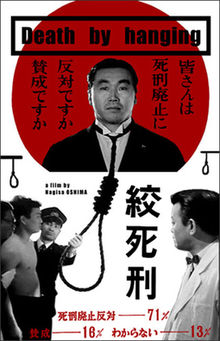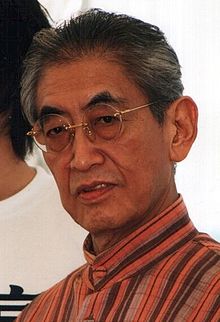Death by Hanging
Death by Hanging , Kshikei? is a 1968 Japanese film directed by Nagisa Oshima, starring Doyun Yu. It was acclaimed for its innovative Brechtian techniques and complex treatments of guilt and consciousness, justice, and the persecution of ethnic Koreans in Japan.
In scenes of absurd and perverse humor, the officials recreate Rs first crime, the rape of a young woman. This failing, they attempt to recreate his childhood by way of performing crude racist stereotypes of Koreans held by some Japanese. Exasperated, they resort to visiting the scene of Rs other crime at an abandoned high school, but in an overzealous moment of reenactment, an official murders a girl. Back in the death chamber, a woman claiming to be Rs sister appears one by one to the officials. She tries to convince R that his crimes are justified by Korean nationalism against a Japanese enemy, but after failing to win him over, is herself hanged. At a drinking party to celebrate her hanging, the officials reveal their guiltridden, violent pasts, oblivious to R and his sister lying on the floor amongst them, themselves exploring Rs psyche. The prosecutor invites R to leave a free man, but when he opens the door, he is driven back by an intense burst of light from outside, symbolizing the fact that as a Korean he will never be accepted by Japanese society. Finally, R admits to the crimes, but proclaims himself innocent stating that if the officers execute him, then they are murderers as well. In his second hanging, Rs body disappears, leaving an empty noose hanging beneath the gallows.The character R in Death by Hanging was based on Ri Chinu, an ethnic Korean who in 1958 murdered two Japanese school girls. A precocious, talented young man, he not only confessed to his crimes, but wrote about them in great detail his writings, collected as Crime, Death, and Love became nearly as famous as his crimes and persona. Much of his book consisted of correspondence with Bok Junan, a Korean journalist sympathetic to the communist North. The sister character was developed from this relationship, indicating the journalists Korean nationalist interpretation of Ris life and experiences. Much of R and the sisters dialogue is taken from this correspondence. Oshima held Ri
Source: Wikipedia



